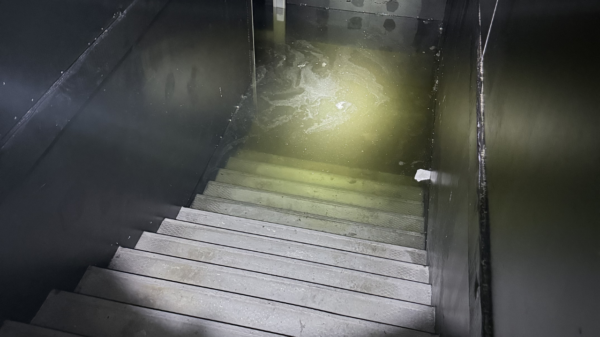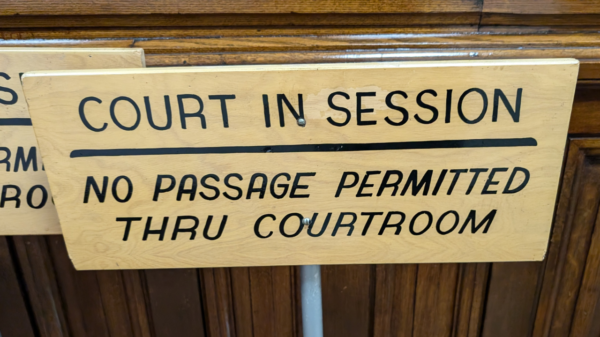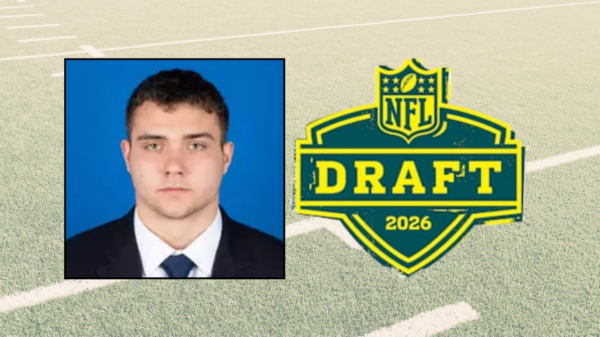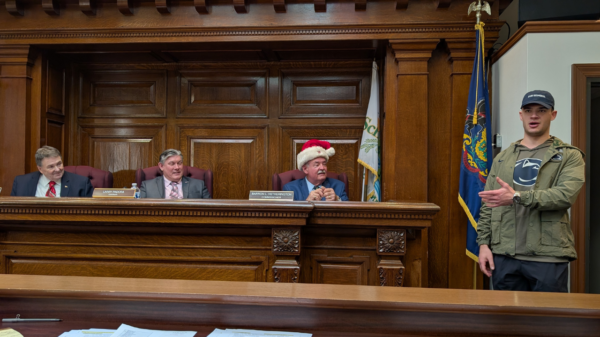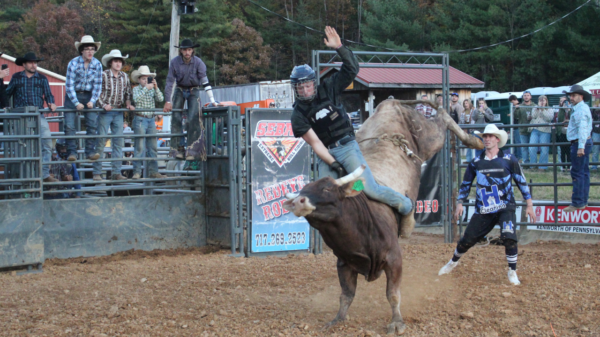North Schuylkill School District challenges a ruling it failed to provide a suitable education environment for an autistic student.
The school filed a federal lawsuit Friday in U.S. District Court for the Middle District of Pennsylvania against the student and their parent.
North Schuylkill wants a federal judge to reverse a decision handed down by a Special Education Hearing Officer earlier this year, in January. That decision awarded 200 hours of education credits to the student. The ruling also found North Schuylkill acted wrongly and violated the student’s civil rights to a public education by confining the student to a desk and chair.
The lawsuit is titled “North Schuylkill School District v. T.C.”.
“T.C.” is the placeholder for the student in this lawsuit. The student attended first grade at North Schuylkill starting in the 2017-18 school year. “T.C.” has autism and North Schuylkill says presented problematic behavior in the school. The behavior puts “T.C.” and other students and staff in danger and is disruptive in school.
Here’s why North Schuylkill is suing the student and parent in federal court.
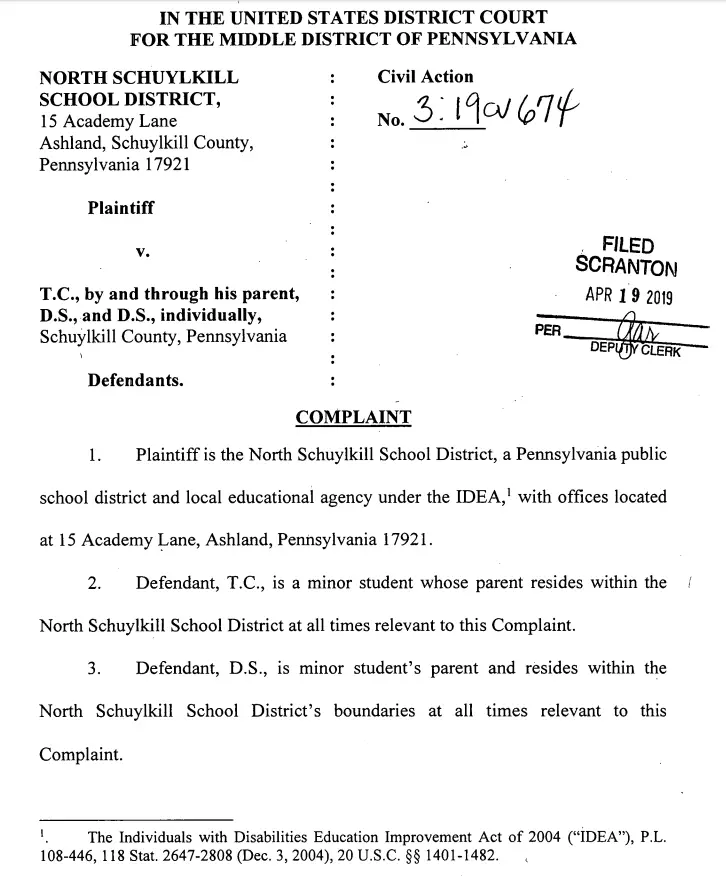
North Schuylkill v. T.C.: The Back Story
“T.C.” started as a kindergarten student in the 2016-17 school year. Prior to attending North Schuylkill, in May, the school and student’s Individualized Education Program team met to identify goals for kindergarten.
In 2017, North Schuylkill requested “T.C.” undergo a Functional Behavioral Assessment at the start of their first grade year. The purpose was to update that IEP for “T.C.”. After getting parental consent from “D.S.”, the parent of “T.C.”, North Schuylkill hired a Board Certified Behavior Analyst named Sadie Hart to conduct the FBA.
On Oct. 26, Hart delivered a written report on “T.C.”. North Schuylkill’s IEP team developed what they call a “Positive Behavior Support Plan” for “T.C.”. This plan designed specifically for “T.C.” rewards positive behavior but doesn’t necessarily deal with negative behavior.
According to Hart’s assessment, “T.C.” did not respond well to being told “No” and when someone took something away from them. This “triggered” aggressive behavior from “T.C.”. North Schuylkill identified new IEP goals for “T.C.” and Hart helped school staff with training on the specific Positive Behavior Support Plan. Part of this plan include the “calming protocol” used to curb aggressive behavior from “T.C.”.
North Schuylkill says the program for “T.C.” appeared to work for much of the student’s first-grade year. But, in Spring 2018, toward the end of the school year, “T.C.” began acting out in school again. “T.C.” had to be taken out of class regularly. Behavioral problems included “moving about on the floor, climbing on tables, pushing his desk, throwing things,” according to the lawsuit paperwork.
The “Calming Protocol”
To get “T.C.” to stop, North Schuylkill staff on hand felt compelled to implement the student’s “calming protocol”.
Now, this is where North Schuylkill begins to stray from the opinions of the Special Ed staff.
The “calming protocol” apparently involves just sitting “T.C.” at a desk and chair in the school’s hallway. An adult stands behind “T.C.” to make sure he doesn’t run away from the desk. The school says this desk isn’t there just for “T.C.”. Rather, the school says, “It was always, and still is, just there.”
Well, it’s the opinion of a Special Education Hearing Officer, brought in to settle this matter in January 2019, that the desk and chair are punishment and an improper confinement. The chair, the school contends, was not an issue with the professional it hired to develop an IEP for “T.C.”.
In fact, the school says “T.C.” was able to move freely in the chair at this lone desk. An adult stood behind “T.C.” so he couldn’t get away or “elope” as the lawsuit states. “T.C.” apparently “eloped” from similar situations in the past. Hence, the adult standing there to make sure it didn’t happen again.
Enter the Pennsylvania Special Education Hearing Officer
Between then and now, the parent of “T.C.”, known as “D.S.” claimed the school was denying their child the right to a public education. The complaint says it denied Free Appropriate Public Education (FAPE) rights to “T.C.” in the 2016-17 and 2017-18 school terms. The complaint says the discrimination was due to “T.C.’s” disability.
So, that’s how we end up with the Special Education Officer earlier this year. Michael J. McElligot, the state’s hearing officer, delivered his decision on this case on January 22, 2019.
In it, McElligot finds the school didn’t violate the FAPE rights of “T.C.” in the kindergarten year. However, that’s the year North Schuylkill didn’t use the “calming protocol” and that’s where McElligot and the district disagree.
He says, in his opinion (included with North Schuylkill’s lawsuit filing), the “calming protocol” was that in name only. In fact, he says, it represents improper restraint and denies “T.C.” FAPE rights.
“The use of the hallway table — although misguided and a denial of FAPE — was simply a poorly implemented behavioral approach,” McElligot writes in his opinion earlier this year.
As a reward for that violation, McElligott granted “T.C.” 200 hours of education credits. “Compensatory education, however, is always an equitable remedy,” he adds.
These credits generally get used to provide tutoring and other services that help meet a student’s IEP goals.
North Schuylkill v. “T.C.”: The Latest
On Friday (paperwork dated April 18 but filed in court dated April 19), North Schuylkill filed a lawsuit opposing this finding.
The school believes it did everything in its power and followed protocol based on the guidance of the professionals it hired to deal with this student individually.
The lawsuit asks a federal judge to reverse the decision and opinions of McElligot.
Subscribe to Coal Region Canary
Get email updates from Coal Region Canary by becoming a subscriber today. Just enter your email address below to get started!Support Coal Region Canary
Like our reporting and want to support truly local news in Schuylkill County? Your small donations help. For as little as $5, your contribution will allow us to cover more news that directly affects you. Consider donating today by hitting the big yellow button below ...






